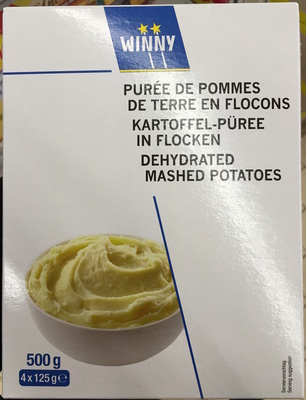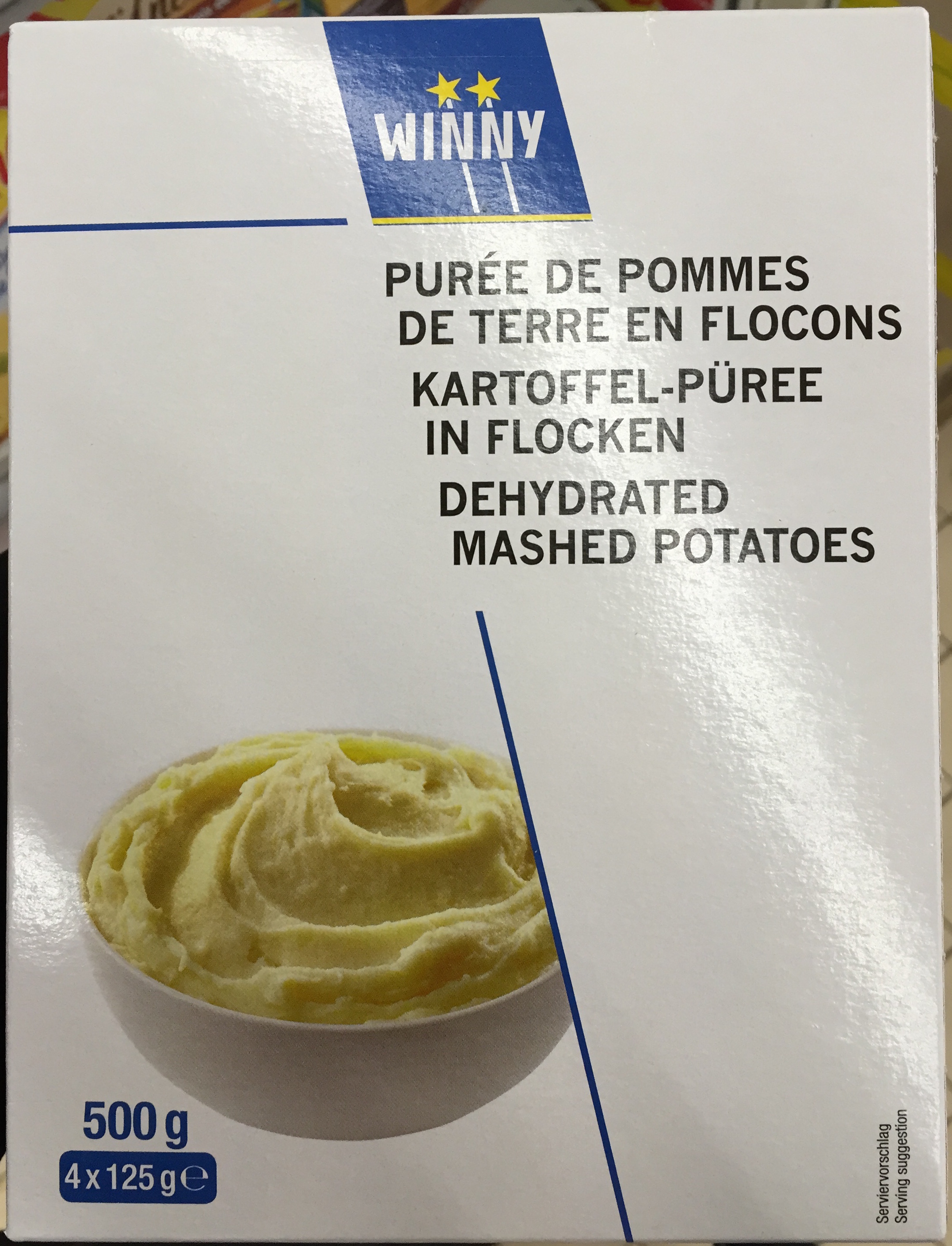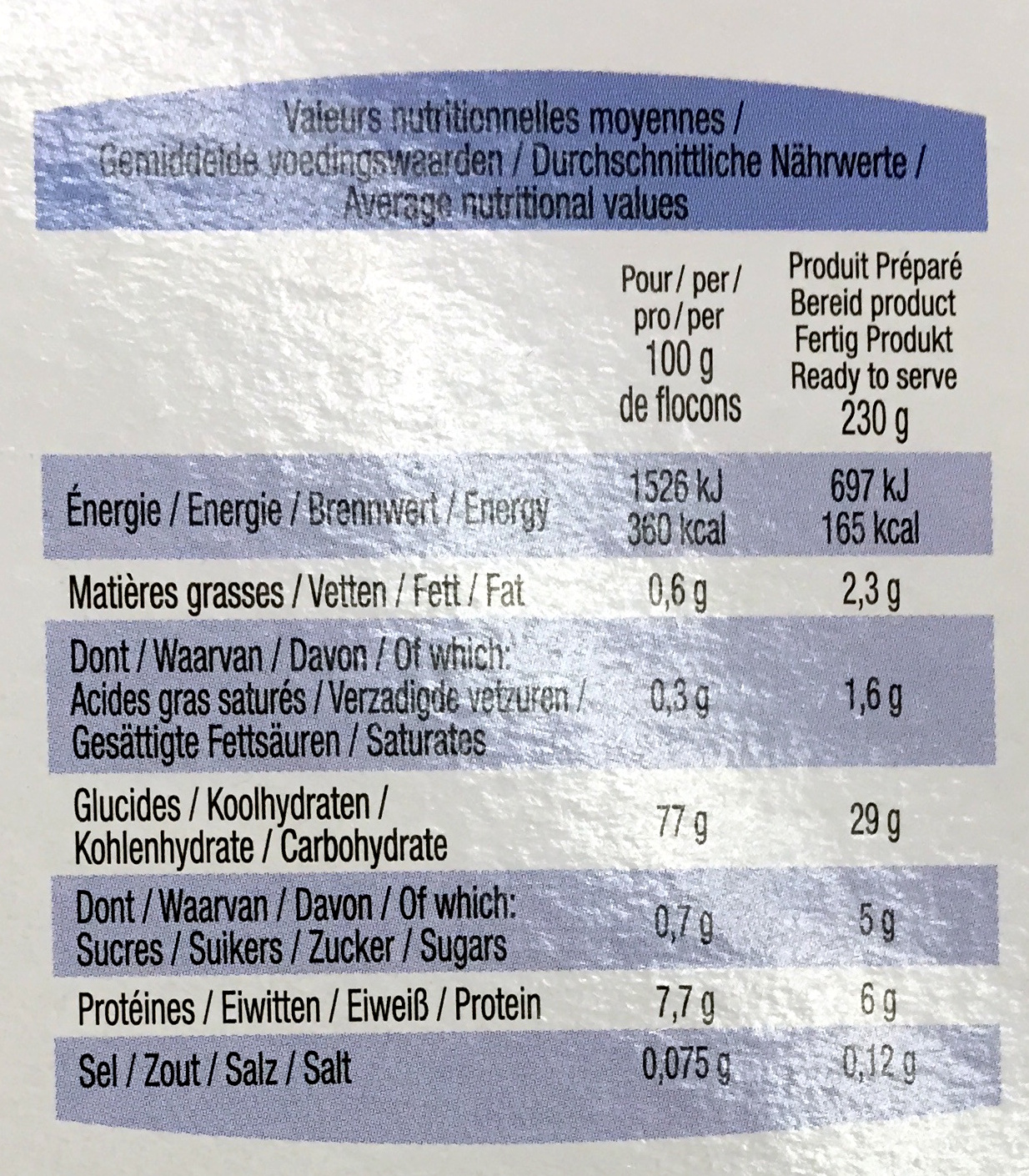Help us make food transparency the norm!
As a non-profit organization, we depend on your donations to continue informing consumers around the world about what they eat.
The food revolution starts with you!
Purée de pommes de terre en flocons - Winny - 4 * 125 g (500 g)
Purée de pommes de terre en flocons - Winny - 4 * 125 g (500 g)
This product page is not complete. You can help to complete it by editing it and adding more data from the photos we have, or by taking more photos using the app for Android or iPhone/iPad. Thank you!
×
Barcode: 5400247019103 (EAN / EAN-13)
Quantity: 4 * 125 g (500 g)
Packaging: Plastic, Bag, Cardboard
Brands: Winny
Categories: Plant-based foods and beverages, Plant-based foods, Cereals and potatoes, Meals, Dried products, Dried products to be rehydrated, Purées, Potato preparations, Mashed potatoes, Instant mashed potatoes
Labels, certifications, awards: Made in the EU
Manufacturing or processing places: Union Européenne
Stores: Cora
Countries where sold: France
Matching with your preferences
Health
Ingredients
-
13 ingredients
French: Pommes de terre déshydratées 99%, émulsifiant : E471, stabilisant : E450i, colorant : E100, conservateur : E223 (sulfites), antioxydant : E304, acidifiant : E330.Allergens: Sulphur dioxide and sulphitesTraces: Milk
Food processing
-
Ultra processed foods
Elements that indicate the product is in the 4 - Ultra processed food and drink products group:
- Additive: E100 - Curcumin
- Additive: E450 - Diphosphates
- Additive: E471 - Mono- and diglycerides of fatty acids
- Ingredient: Colour
- Ingredient: Emulsifier
Food products are classified into 4 groups according to their degree of processing:
- Unprocessed or minimally processed foods
- Processed culinary ingredients
- Processed foods
- Ultra processed foods
The determination of the group is based on the category of the product and on the ingredients it contains.
Additives
-
E223 - Sodium metabisulphite
Sodium metabisulfite: Sodium metabisulfite or sodium pyrosulfite -IUPAC spelling; Br. E. sodium metabisulphite or sodium pyrosulphite- is an inorganic compound of chemical formula Na2S2O5. The substance is sometimes referred to as disodium metabisulfite. It is used as a disinfectant, antioxidant, and preservative agent.Source: Wikipedia
-
E304 - Fatty acid esters of ascorbic acid
Ascorbyl palmitate: Ascorbyl palmitate is an ester formed from ascorbic acid and palmitic acid creating a fat-soluble form of vitamin C. In addition to its use as a source of vitamin C, it is also used as an antioxidant food additive -E number E304-. It is approved for use as a food additive in the EU, the U.S., Canada, Australia, and New Zealand.Ascorbyl palmitate is known to be broken down -through the digestive process- into ascorbic acid and palmitic acid -a saturated fatty acid- before being absorbed into the bloodstream. Ascorbyl palmitate is also marketed as "vitamin C ester".Source: Wikipedia
-
E330 - Citric acid
Citric acid is a natural organic acid found in citrus fruits such as lemons, oranges, and limes.
It is widely used in the food industry as a flavor enhancer, acidulant, and preservative due to its tart and refreshing taste.
Citric acid is safe for consumption when used in moderation and is considered a generally recognized as safe (GRAS) food additive by regulatory agencies worldwide.
-
E450 - Diphosphates
Diphosphates (E450) are food additives often utilized to modify the texture of products, acting as leavening agents in baking and preventing the coagulation of canned food.
These salts can stabilize whipped cream and are also found in powdered products to maintain their flow properties. They are commonly present in baked goods, processed meats, and soft drinks.
Derived from phosphoric acid, they're part of our daily phosphate intake, which often surpasses recommended levels due to the prevalence of phosphates in processed foods and drinks.
Excessive phosphate consumption is linked to health issues, such as impaired kidney function and weakened bone health. Though diphosphates are generally regarded as safe when consumed within established acceptable daily intakes, it's imperative to monitor overall phosphate consumption to maintain optimal health.
-
E471 - Mono- and diglycerides of fatty acids
Mono- and diglycerides of fatty acids (E471), are food additives commonly used as emulsifiers in various processed foods.
These compounds consist of glycerol molecules linked to one or two fatty acid chains, which help stabilize and blend water and oil-based ingredients. E471 enhances the texture and shelf life of products like margarine, baked goods, and ice cream, ensuring a smooth and consistent texture.
It is generally considered safe for consumption within established regulatory limits.
Ingredients analysis
-
May contain palm oil
Ingredients that may contain palm oil: E471, E304
-
Maybe vegan
Ingredients that may not be vegan: E471, E304
-
Maybe vegetarian
Ingredients that may not be vegetarian: E471, E304
-
Details of the analysis of the ingredients
fr: Pommes de terre 99%, émulsifiant (e471), stabilisant (e450i), colorant (e100), conservateur (e223), antioxydant (e304), acidifiant (e330)- Pommes de terre -> en:potato - vegan: yes - vegetarian: yes - ciqual_food_code: 4003 - percent_min: 99 - percent: 99 - percent_max: 99
- émulsifiant -> en:emulsifier - percent_min: 0.166666666666667 - percent_max: 1
- e471 -> en:e471 - vegan: maybe - vegetarian: maybe - from_palm_oil: maybe - percent_min: 0.166666666666667 - percent_max: 1
- stabilisant -> en:stabiliser - percent_min: 0 - percent_max: 0.833333333333329
- e450i -> en:e450i - vegan: yes - vegetarian: yes - percent_min: 0 - percent_max: 0.833333333333329
- colorant -> en:colour - percent_min: 0 - percent_max: 0.416666666666664
- e100 -> en:e100 - vegan: yes - vegetarian: yes - percent_min: 0 - percent_max: 0.416666666666664
- conservateur -> en:preservative - percent_min: 0 - percent_max: 0.277777777777776
- e223 -> en:e223 - vegan: yes - vegetarian: yes - percent_min: 0 - percent_max: 0.277777777777776
- antioxydant -> en:antioxidant - percent_min: 0 - percent_max: 0.277777777777776
- e304 -> en:e304 - vegan: maybe - vegetarian: maybe - from_palm_oil: maybe - percent_min: 0 - percent_max: 0.277777777777776
- acidifiant -> en:acid - percent_min: 0 - percent_max: 0.166666666666666
- e330 -> en:e330 - vegan: yes - vegetarian: yes - percent_min: 0 - percent_max: 0.166666666666666
Nutrition
-
Very good nutritional quality
⚠ ️Warning: the amounts of fiber and of fruits, vegetables and nuts are not specified, their possible positive contribution to the grade could not be taken into account.This product is not considered a beverage for the calculation of the Nutri-Score.
Positive points: 1
- Proteins: 1 / 5 (value: 2.61, rounded value: 2.61)
- Fiber: 0 / 5 (value: 0, rounded value: 0)
- Fruits, vegetables, nuts, and colza/walnut/olive oils: 0 / 5 (value: 0, rounded value: 0)
Negative points: 0
- Energy: 0 / 10 (value: 303, rounded value: 303)
- Sugars: 0 / 10 (value: 2.17, rounded value: 2.17)
- Saturated fat: 0 / 10 (value: 0.696, rounded value: 0.7)
- Sodium: 0 / 10 (value: 20.9, rounded value: 20.9)
The points for proteins are counted because the negative points are less than 11.
Nutritional score: (0 - 1)
Nutri-Score:
-
Nutrient levels
-
Fat in low quantity (1%)
What you need to know- A high consumption of fat, especially saturated fats, can raise cholesterol, which increases the risk of heart diseases.
Recommendation: Limit the consumption of fat and saturated fat- Choose products with lower fat and saturated fat content.
-
Saturated fat in low quantity (0.696%)
What you need to know- A high consumption of fat, especially saturated fats, can raise cholesterol, which increases the risk of heart diseases.
Recommendation: Limit the consumption of fat and saturated fat- Choose products with lower fat and saturated fat content.
-
Sugars in low quantity (2.17%)
What you need to know- A high consumption of sugar can cause weight gain and tooth decay. It also augments the risk of type 2 diabetes and cardio-vascular diseases.
Recommendation: Limit the consumption of sugar and sugary drinks- Sugary drinks (such as sodas, fruit beverages, and fruit juices and nectars) should be limited as much as possible (no more than 1 glass a day).
- Choose products with lower sugar content and reduce the consumption of products with added sugars.
-
Salt in low quantity (0.0522%)
What you need to know- A high consumption of salt (or sodium) can cause raised blood pressure, which can increase the risk of heart disease and stroke.
- Many people who have high blood pressure do not know it, as there are often no symptoms.
- Most people consume too much salt (on average 9 to 12 grams per day), around twice the recommended maximum level of intake.
Recommendation: Limit the consumption of salt and salted food- Reduce the quantity of salt used when cooking, and don't salt again at the table.
- Limit the consumption of salty snacks and choose products with lower salt content.
-
-
Nutrition facts
Nutrition facts As sold
for 100 g / 100 mlPrepared
for 100 g / 100 mlPrepared
per serving (230 g)Compared to: Instant mashed potatoes Energy 1,526 kj
(360 kcal)303 kj
(71 kcal)697 kj
(165 kcal)+26% Fat 0.6 g 1 g 2.3 g -65% Saturated fat 0.3 g 0.696 g 1.6 g -67% Carbohydrates 77 g 12.6 g 29 g +32% Sugars 0.7 g 2.17 g 5 g -71% Fiber ? ? ? Proteins 7.7 g 2.61 g 6 g +21% Salt 0.075 g 0.052 g 0.12 g -91% Fruits‚ vegetables‚ nuts and rapeseed‚ walnut and olive oils (estimate from ingredients list analysis) 0 % ? ?
Environment
-
Eco-Score B - Low environmental impact
⚠ ️Select a country in order to include the full impact of transportation.The Eco-Score is an experimental score that summarizes the environmental impacts of food products.→ The Eco-Score was initially developped for France and it is being extended to other European countries. The Eco-Score formula is subject to change as it is regularly improved to make it more precise and better suited to each country.Life cycle analysis
-
Average impact of products of the same category: A (Score: 93/100)
Category: Potato puree, made from flakes, reconstituted with semi-skimmed milk and water, unsalted
Category: Potato puree, made from flakes, reconstituted with semi-skimmed milk and water, unsalted
- PEF environmental score: 0.16 (the lower the score, the lower the impact)
- including impact on climate change: 1.39 kg CO2 eq/kg of product
Stage Impact Agriculture
55.3 %Processing
21.4 %Packaging
10.2 %Transportation
7.5 %Distribution
3.0 %Consumption
2.5 %
Bonuses and maluses
-
Missing origins of ingredients information
Malus: -5
⚠ ️ The origins of the ingredients of this product are not indicated.
If they are indicated on the packaging, you can modify the product sheet and add them.
If you are the manufacturer of this product, you can send us the information with our free platform for producers.
-
Packaging with a medium impact
Malus: -11
Shape Material Recycling Impact Bag Plastic High Unknown Cardboard Low ⚠ ️ The information about the packaging of this product is not sufficiently precise (exact shapes and materials of all components of the packaging).⚠ ️ For a more precise calculation of the Eco-Score, you can modify the product page and add them.
If you are the manufacturer of this product, you can send us the information with our free platform for producers.
Eco-Score for this product
-
Impact for this product: B (Score: 77/100)
Product: Purée de pommes de terre en flocons - Winny - 4 * 125 g (500 g)
Life cycle analysis score: 93
Sum of bonuses and maluses: -16
Final score: 77/100
-
Carbon footprint
-
Equal to driving 0.7 km in a petrol car
139 g CO² per 100g of product
The carbon emission figure comes from ADEME's Agribalyse database, for the category: Potato puree, made from flakes, reconstituted with semi-skimmed milk and water, unsalted (Source: ADEME Agribalyse Database)
Stage Impact Agriculture
60.1 %Processing
13.0 %Packaging
13.8 %Transportation
10.9 %Distribution
1.4 %Consumption
0.8 %
Packaging
-
Packaging with a medium impact
-
Packaging parts
Bag (Plastic)
(Cardboard)
-
Packaging materials
Material % Packaging weight Packaging weight per 100 g of product Paper or cardboard Plastic Total
-
Transportation
-
Origins of ingredients
Missing origins of ingredients information
⚠ ️ The origins of the ingredients of this product are not indicated.
If they are indicated on the packaging, you can modify the product sheet and add them.
If you are the manufacturer of this product, you can send us the information with our free platform for producers.Add the origins of ingredients for this product Add the origins of ingredients for this product
Report a problem
-
Incomplete or incorrect information?
Category, labels, ingredients, allergens, nutritional information, photos etc.
If the information does not match the information on the packaging, please complete or correct it. Open Food Facts is a collaborative database, and every contribution is useful for all.
Data sources
Product added on by tacite
Last edit of product page on by jayaddison.
Product page also edited by packbot, roboto-app.









